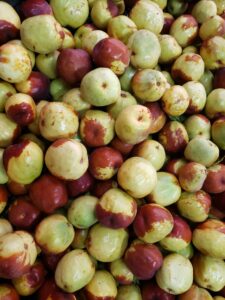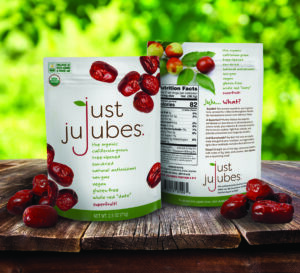Progress report for FW24-018
Project Information

The research question that RFR seeks to answer is: "Will increased education of the public regarding the health benefits of jujubes result in increased sales and profit?"
Customers have been invited on social media to participate in discussions on whether their purchases of jujubes have increased as they learn more about the health benefits of the fruit. Jujube nutrient information has been provided to inform the discussion. The discussion results are informing RFR's marketing efforts.
The project is significant for the growth of the jujube industry in California. In a normal rainfall year in the Cuyama Valley, no irrigation is needed and fertilization requirements of jujubes are very low. This drought tolerance is especially important in this area which has been identified as "critically overdrafted" by the Department of Water Resources (DWR). This means more water has been pumped out of the ground than is replenished by rainfall, stream flows, and other sources. According to the DWR report, in an evaluation of the period from 1989 to 2009, the Cuyama Valley is in "a basin subject to critical overdraft when continuation of present water management practices would probably result in significant adverse overdraft-related environmental, social or economic impacts." https://cuyamabasin.org/gw-sustainability
Jujube trees contribute to sustainable agriculture in part because of their ability to prevent erosion. In turn, the land surrounding the trees becomes an excellent habitat for wildflowers that contribute to RFR's other crop, honey, which increases our crop diversification.
Dissemination of information to producers has been occurring at the California Rare Fruit Growers Conference, organic conferences, social media, our e-newsletter, and in classes taught by Alisha Taff at Allan Hancock College.
This outreach is increasing the number of farmers who grow and market jujubes, as well as increasing the farmers' interest in sustainable agriculture.

and ready for distribution.


RESEARCH: Marketing Research
Determine the effectiveness of disseminating health information about jujubes to store buyers and the general public. Handouts will be created, online discussions have been conducted, and results will be published on social media platforms as well as in our e-newsletter. Success will be measured by increase in sales.
EDUCATION:
Classes have been taught at Allan Hancock College to socially disadvantaged students seeking to learn about income-producing crops. Presentations and classes will be offered to farmers who are interested in growing and marketing jujubes. The curriculum includes history of this traditional crop, best varieties for the Central California region, care of jujube trees, food safety compliance, and pre- and post-harvest best practices for timely harvesting, drying, storage and record-keeping.
Cooperators
- - Technical Advisor (Researcher)
- (Educator)
Research

Project Site: The Research portion of this project is taking place mostly online, using Facebook for information and discussions, RFR's website for information dissemination, and frequent communication with customers via RFRs extensive 5,000-customer e-mail list.
Much of the fulfillment of this project will take place in classrooms through the Central California area, with Ms. Taff providing education on growing and marketing jujubes to a variety of students, including socially disadvantaged beginning farmers.
Rock Front Ranch is doing on-site research at the ranch on different varieties of jujubes and presenting marketing workshops for producers with an emphasis on using the nutrient content of jujubes in marketing efforts.
Research Design: Research is carefully designed to build on previous efforts by RFR to engage customers by posting and e-mailing articles and scientific studies that relate to perceived positive health effects of adding fresh and dried jujubes to the diet.
There has been extensive research on the health benefits of jujubes in recent years, mostly in China and Korea. RFR will build on this research to provide input on marketing jujubes in the US.
Research will include identifying the nutrient content of jujubes and correlating the nutrients with accepted health benefits (e.g., calcium for strong bones and teeth).
RFR will use its own records, found in Quick Books, to track customer response by comparing sales month over month and year over year.
Data Collection: Data collection will be the responsibility of Nancy Smith. She will use extensive customer data in Quick Books, customer responses on Facebook and Instagram, personal contact with producers via telephone and e-mail as well as student feedback in an effort to collect as much meaningful marketing data as possible.
Methods of Analysis: Month over month and year over year comparisons using sales records; customer surveys; producer surveys will provide an accurate method of analysis of changes in marketing results in response to the proposed change in emphasis in RFR's marketing campaign.
Awareness of Previous Work: We carefully researched 17 previous scientific studies on the health properties of jujubes as well as referring to the USDA table of Jujube Nutrients. We studied previous SARE projects to find points of similarity with them. SARE Project LS23-382, although not specific to jujube marketing or nutrient analysis, did provide inspiration to us by its study of consumers' relationship with food, including an increased interest in prioritizing healthy foods and foods grown in ways that support the planet. That project also supported farmers to understand consumer values and in turn provide effective communication. It called for research to better understand barriers and values and across consumers and studied variations in how consumers respond to educational and promotional materials. We believe our proposed project addresses the need identified by Project LS23-382.
Tools and Materials:

The primary marketing tools and materials at RFR are ads and posters on our website, Facebook page, Instagram page and our extensive 5,000-customer list.
The primary source for marketing information is our Quick Books account, which lists all orders, all customers, what they ordered and when. This provides an excellent source for comparison of month over month and year over year sales and income.
WSARE surveys will be used as a tool to gauge producer responses.
Measurement and Evaluation:
The primary measurement of response to the project will be found on the insights page of Meta Suite, the Facebook and Instagram page that analyzes response to posts. Surveys will be performed by conversations with students and WSARE survey forms.
Quick Books tracks sales per customer, and the success of the program will be measured by the increase in sales.
How will research be conducted in an innovative way or provide an innovative approach to solving the problem?
The most innovative quality of the research is that jujubes are, in themselves, an innovative crop in the United States. Research will include examining seventeen scientific studies that were performed in other countries, mostly China, and comparing these studies to information found in US studies. The resulting data will be used in RFRs proposed marketing campaign.
This research will be bolstered by anecdotal accounts from our customers on their observations of changes in their health after adding jujubes to their diets.
It is clear that Chinese scientists have long recognized the value of jujubes as a nutritious food, and have devoted a great deal of effort to study the benefits of jujubes in the diet. Jujubes have a 3,000-year history in China, which clearly shows the importance of the fruit in that country. Consumers in the US are just beginning to show an interest in jujubes, often driven by demand from Asian immigrants who consider them to be an important part of their diet. This project would help enable the US to place more emphasis on a crop that is both nutritious and helpful to the planet.
Using the many tools provided by online platforms provides an innovative way to track data, communicate with customers, and disseminate results. Meta Suite and Facebook Insights provide tools for analysis that are very helpful when used in an organized manner.
Requests on social media for survey participants resulted in a number of volunteers.
A focus group of 4 customers was formed, and fresh and dried jujubes were sent to the members of the group. Members reported that the health information was helpful to them, and encouraged them to eat more jujubes. Two of the focus group members reported increased energy and better sleep when they added jujubes to their diet.
E-mails and phone calls were made to the participants, resulting in feedback that can be used to advertise jujubes more effectively using nutritional information.
Overall jujubes sales were up 20% year over year, despite a short growing season due to extreme drought conditions. Overall sales of all ranch products were up 2% year over year.
Research outcomes
Zoom meetings have been held with a select focus group. An outcome of the zoom meetings has been that the participants report increased consumption of dried jujubes as a snack because we have provided significant nutritional information using a number of venues, including social media and bulk e-mails.
We recommend that producers make an effort to communicate with current and potential customers about the qualities of their products. We can document an increase of 20% in sales of dried jujubes, which is directly traceable to customer outreach.
Education and Outreach
Participation summary:
EDUCATIONAL OBJECTIVES:
1. We will compile and provide information from scientific studies about the health benefits of the vitamins, minerals and other qualities of jujubes to:
a) Producers
b) Customers
c) Students
d) Agricultural Professionals
2. We will make use of the compiled information to inform a new marketing campaign that is nutrition-based.
3. We will track results of the marketing campaign using increased income as a measure, and by encouraging engagement on our website and social media pages.
4. We will disseminate the project results to producers, customers, students and agricultural professionals using a variety of means such as our website, which has a special educational section, and directly to customers and producers who attend meetings and presentations.
OUTREACH ACTIVITIES: Demonstrations, classes, presentations, producer meetings, online presentations and discussions, e-newsletters.
- Demonstrations and presentations will be conducted at producer meetings.
- Posters, factsheets, charts and results of academic scientific studies will be used to educate farmers and customers on the health benefits derived from eating the vitamins and minerals contained in jujubes.
- Classes on marketing jujubes will be held for socially disadvantaged farmers and socially disadvantaged students.
- Zoom presentations will be targeted to producers in a wider area.
- Facebook and Instagram will be used to encourage discussions among farmers and consumers.
- Our existing 5,000-customer e-mail list will receive monthly e-newsletters that provide information about the vitamin and mineral content of jujubes as per USDA and academic scientific research, and how those vitamins, minerals, and other components of jujubes can assist with or prevent various health issues, such as cardiovascular issues and insomnia. Great care will be taken to avoid unproven or misleading health claims. The emphasis will be on nutrients and their relationship to health.
- Allan Hancock College in Lompoc, CA will provide classroom space for Alisha Taff to teach socially disadvantaged beginning farmers and ranchers as well as students who are interested in becoming farmers and ranchers how to grow and market jujubes.
TARGETED AUDIENCE: Existing customer base, potential customers, academics, health professionals, store buyers and agricultural professionals.
Rock Front Ranch will do some on-site research on different varieties of jujubes, and a workshop for customers, stakeholders, students, producers and agricultural professionals.
EDUCATIONAL RESOURCES: 2 factsheets, 2 PowerPoint presentations, 1 video, 2 posters will be created and presented to stakeholders.
COMMUNICATION TO PRODUCERS: Phone calls, e-mails, producer meetings, trainings. All the producers are socially disadvantaged beginning farmers.
INNOVATIVE EDUCATION PLAN: Our education plan is innovative because it communicates health benefits of the component vitamins and minerals in jujubes and measures response to this targeted marketing plan.
The education plan involves multiple media outlets such as e-mail, e-newsletters, newsletter, Facebook, Instagram, and educational pages on our website and is trackable using the tools provided by social media and built into our outreach programs, such as Meta Suites and Insights on Facebook, and feedback via e-mail that will be encouraged and incentivized by our e-newsletters.
Education and Outreach Outcomes
Nutritional information.
